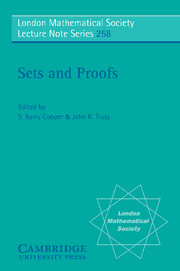Book contents
- Frontmatter
- Contents
- Preface
- An Introduction To Finitary Analyses Of Proof Figures
- What Mathematical Truth Could Not Be – II
- Proof Search in Constructive Logics
- David's Trick
- A Semantical Calculus for Intuitionistic Propositional Logic
- An Iteration Model Violating the Singular Cardinals Hypothesis
- An Introduction to Core Model Theory
- Games of Countable Length
- On the Complexity of the Propositional Calculus
- The Realm of Orinal Analysis
- Covering Properties of Core Models
- Ordinal Systems
- Polish Group Topologies
- Forcing Closed Unbounded Subsets of Nw+1
- First Steps into Metapredicativity in Explicit Mathematics
- What Makes A (Pointwise) Subrecursive Hierarchy Slow Growing?
- Minimality Arguments for Infinite Time Turing Degrees
An Introduction to Core Model Theory
Published online by Cambridge University Press: 05 September 2013
- Frontmatter
- Contents
- Preface
- An Introduction To Finitary Analyses Of Proof Figures
- What Mathematical Truth Could Not Be – II
- Proof Search in Constructive Logics
- David's Trick
- A Semantical Calculus for Intuitionistic Propositional Logic
- An Iteration Model Violating the Singular Cardinals Hypothesis
- An Introduction to Core Model Theory
- Games of Countable Length
- On the Complexity of the Propositional Calculus
- The Realm of Orinal Analysis
- Covering Properties of Core Models
- Ordinal Systems
- Polish Group Topologies
- Forcing Closed Unbounded Subsets of Nw+1
- First Steps into Metapredicativity in Explicit Mathematics
- What Makes A (Pointwise) Subrecursive Hierarchy Slow Growing?
- Minimality Arguments for Infinite Time Turing Degrees
Summary
Abstract. In this paper we give an informal introduction to core model theory at the level of Woodin cardinals.
Introduction
Zermelo-Praenkel set theory with choice, or ZFC, is the commonly accepted system of axioms for set theory, and hence for all of mathematics. Most of the axioms of ZFC express closure properties of the universe of sets. (The exceptions are Extensionality and Foundation, which in effect limit the objects under consideration.) Although all mathematical assertions can be expressed in the language of ZFC, and “most” of them can be decided using only the axioms of ZFC, there are nevertheless interesting mathematical assertions which cannot be decided using ZFC alone. The most famous of these is the Continuum Hypothesis.
Gödel's response to the incompleteness of ZFC with respect to assertions like the Continuum Hypothesis was that one should seek well–justified extensions of ZFC which decide these assertions (cf. [Gö47]). This is known as “Gödel's Program” and is still one of the most important tasks of higher set theory. Gödel suggested strong axioms of infinity, now more commonly known as large cardinal axioms, as candidates for basic principles to be added to the foundation provided by ZFC. In the years since [GÖ47], large cardinal axioms have been extensively investigated, and have proved very fruitful in deciding in natural ways propositions about the real numbers left undecided by ZFC. They do not decide the Continuum Hypothesis, however.
Information
- Type
- Chapter
- Information
- Sets and Proofs , pp. 103 - 158Publisher: Cambridge University PressPrint publication year: 1999
Accessibility standard: Unknown
Why this information is here
This section outlines the accessibility features of this content - including support for screen readers, full keyboard navigation and high-contrast display options. This may not be relevant for you.Accessibility Information
- 5
- Cited by
